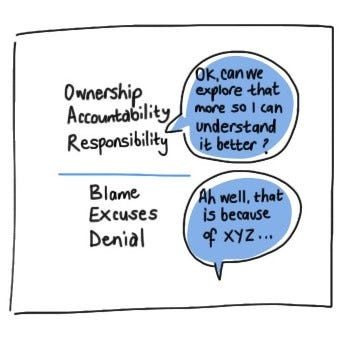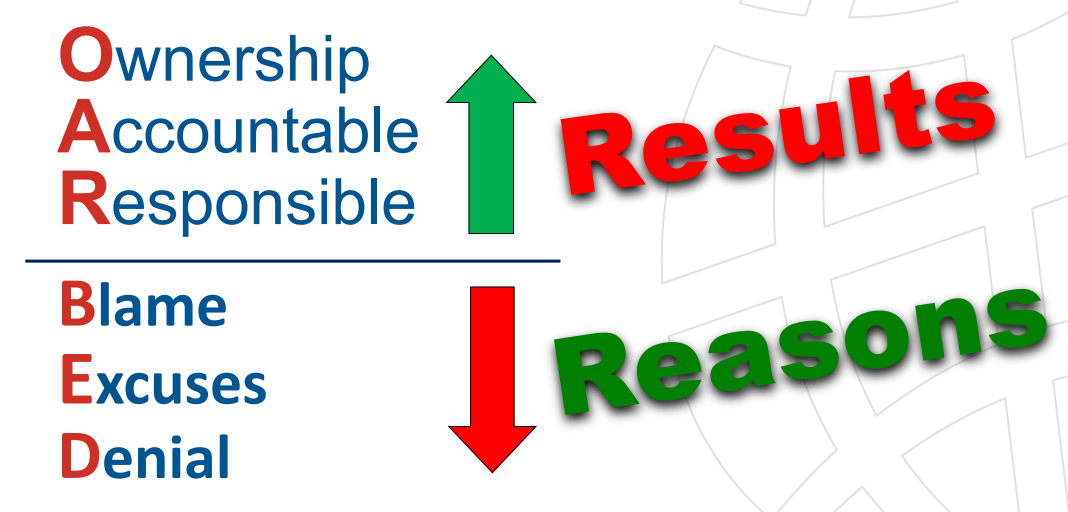Understanding the OARBED Behaviour Model

Running a business in a rural community comes with its own unique challenges and opportunities. Whether you’re managing a farm, a local retail store, or a growing service business, success often depends on how you and your team approach problems and take ownership of outcomes. That’s where the OARBED Behaviour Model comes in—a simple yet powerful framework that can help rural business owners and their employees develop a mindset of responsibility and accountability.
What is the OARBED Behaviour Model?
The OARBED model breaks human behaviour into two categories: proactive, solution-focused behaviours and reactive, problem-focused behaviours. The model is visually represented as a dividing line, with productive actions above the line and unproductive ones below the line.

Above the Line: OAR (Ownership, Accountability, Responsibility)
Ownership – Taking full responsibility for your actions, decisions, and their outcomes. Business owners and employees who adopt an ownership mindset see challenges as opportunities to improve rather than excuses to blame others.
Accountability – Following through on commitments and ensuring that both successes and failures are acknowledged. Being accountable means recognizing how your actions contribute to the overall business results.
Responsibility – Taking proactive steps to solve problems rather than waiting for someone else to fix them. This means continuously learning, adapting, and making necessary changes to improve business operations.
Below the Line: BED (Blame, Excuses, Denial)
Blame – Shifting responsibility onto others rather than recognizing one’s own role in a situation. This can create a negative work environment and slow down problem-solving.
Excuses – Justifying poor results with external reasons rather than focusing on how to change or improve. Excuses prevent progress and keep businesses stuck in unproductive cycles.
Denial – Refusing to acknowledge problems or challenges, which often leads to missed opportunities for growth and improvement.
Why is OARBED Important for Rural Businesses?
In rural communities, businesses often operate with tight-knit teams, limited resources, and strong community ties. The OARBED model helps business owners and employees foster a culture of accountability and problem-solving, which can be a game-changer in a competitive and often unpredictable market.
By staying above the line (OAR) and encouraging employees to take ownership, be accountable, and act responsibly, rural businesses can:
-
Improve teamwork and collaboration
-
Increase efficiency and productivity
-
Foster trust within the community
-
Adapt more quickly to changes in the market
How to Apply OARBED in Your Business
-
Lead by Example – As a business owner or manager, embody the OAR mindset. Show ownership, accountability, and responsibility in your daily actions.
-
Encourage Open Communication – Create an environment where employees feel comfortable acknowledging mistakes and working on solutions rather than blaming others.
-
Set Clear Expectations – Define what accountability looks like in your business and ensure every team member understands their role.
-
Recognize and Reward OAR Behaviours – Celebrate employees who take initiative and show responsibility.
-
Address BED Behaviours Quickly – When you notice blame, excuses, or denial creeping into conversations, redirect the focus to solutions and positive action.
Final Thoughts
The OARBED Behaviour Model is a simple yet transformative way to develop a culture of accountability in rural businesses. By staying above the line, you can build a business that thrives despite challenges, fosters a positive work environment, and strengthens relationships with customers and the community.
At RuralCA, we’re committed to helping rural businesses not only manage their finances but also develop the right mindset for long-term success. If you’d like to learn more about how to apply OARBED in your business, feel free to reach out to us today!